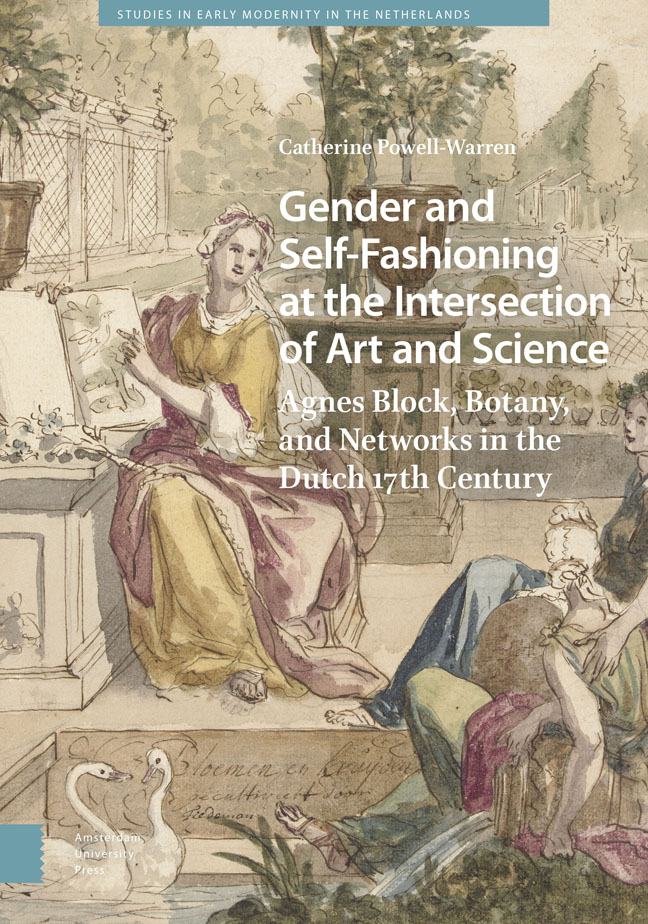 Gender and Self-Fashioning at the Intersection of Art and Science
Gender and Self-Fashioning at the Intersection of Art and Science Book contents
- Frontmatter
- Dedication
- Contents
- List of Figures and Photographic Credits
- Acknowledgements
- Introduction
- 1 Vijverhof and the Pursuit of Nature
- 2 Vijverhof in Context
- 3 Vijverhof as a Space of Knowledge Creation, Exchange, and Relationships
- 4 Becoming Flora Batava
- 5 Flora Batava in Context
- 6 The Bloemenboek and Block’s Watercolours: Self-Fashioning at the Intersection of Art and Science
- 7 The Bloemenboek as a Meeting Place and Visual Manifestation of Agnes Block’s Artistic Network
- Conclusion
- Appendix A
- Bibliography
- Index
Conclusion
Published online by Cambridge University Press: 20 February 2024
- Frontmatter
- Dedication
- Contents
- List of Figures and Photographic Credits
- Acknowledgements
- Introduction
- 1 Vijverhof and the Pursuit of Nature
- 2 Vijverhof in Context
- 3 Vijverhof as a Space of Knowledge Creation, Exchange, and Relationships
- 4 Becoming Flora Batava
- 5 Flora Batava in Context
- 6 The Bloemenboek and Block’s Watercolours: Self-Fashioning at the Intersection of Art and Science
- 7 The Bloemenboek as a Meeting Place and Visual Manifestation of Agnes Block’s Artistic Network
- Conclusion
- Appendix A
- Bibliography
- Index
Summary
Abstract: This book concludes that Agnes Block was not alone in engaging in selffashioning, even though early modern women had to navigate gender expectations and faced limitations due to their gender, particularly when it came to membership in formal institutions. Informal networks, however, were key in allowing Block to exercise her agency and become an influential cultural producer. While she did not take to the metaphorical barricades in seeking gender equality, her actions—in collecting art and naturalia, and developing Vijverhof—evidence the emergence of a feminist consciousness.
Keywords: feminist consciousness; female power and agency; informal networks; female self-fashioning
Seventeenth-century Dutch genre paintings of fishwives, egg sellers, maids, and mothers reveal early modern women’s essential contribution to household management and to the early modern economy. Rarely depicted, however, are the achievements of early modern women outside of this domestic realm. Yet, as this book demonstrates, women contributed to culture, arts, and the creation and dissemination of knowledge.
Agnes Block’s world was one in which the extent to which women could participate in the economy, exercise power and agency in a public sphere, and engage in self-fashioning depended on a number of factors, not the least of which included their socio-economic and marital status. Block was fortunate in that she came from a wealthy family that valued education, art, and intellectual pursuits. Through hard work and devotion, she built upon these advantages to become a well-learned, knowledgeable, and respected amateur botanist and an influential patron.
Notwithstanding her auspicious beginnings, however, Block still had to navigate socio-cultural impediments and institutional barriers. She did so by participating in informal networks of experts and amateurs in botany, collectors, and artists, which shared a considerable amount of overlap. As an amateur botanist, she befriended Paul Hermann, director of the Leiden hortus botanicus, and developed relationships with other high-profile experts, such as Caspar Commelin, William Sherard, Jacob Breyne, and Lelio Trionfetti. She provided them with seeds and bulbs, and her expertise. They reciprocated by sharing specimens with her and including her in their botanical treatises, thus bestowing upon her prestige and legitimacy as a knowledgeable botanist.
As a patron, she retained some of the best-known artists of the time—Herman Saftleven, Willem de Heer, Pieter Holsteyn, Maria Sibylla Merian, and Alida Withoos.
- Type
- Chapter
- Information
- Gender and Self-Fashioning at the Intersection of Art and ScienceAgnes Block, Botany, and Networks in the Dutch 17th Century, pp. 263 - 266Publisher: Amsterdam University PressPrint publication year: 2023


